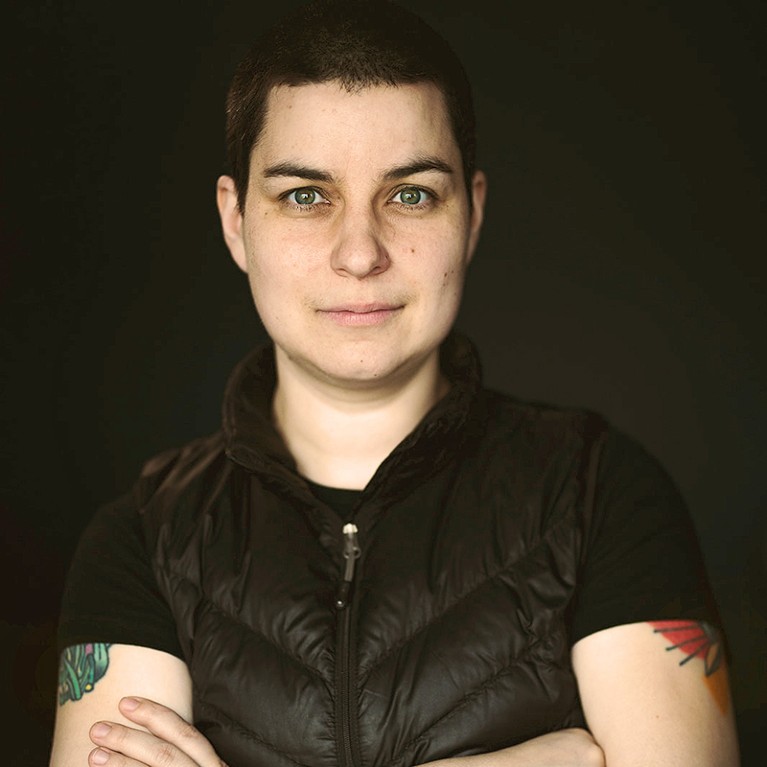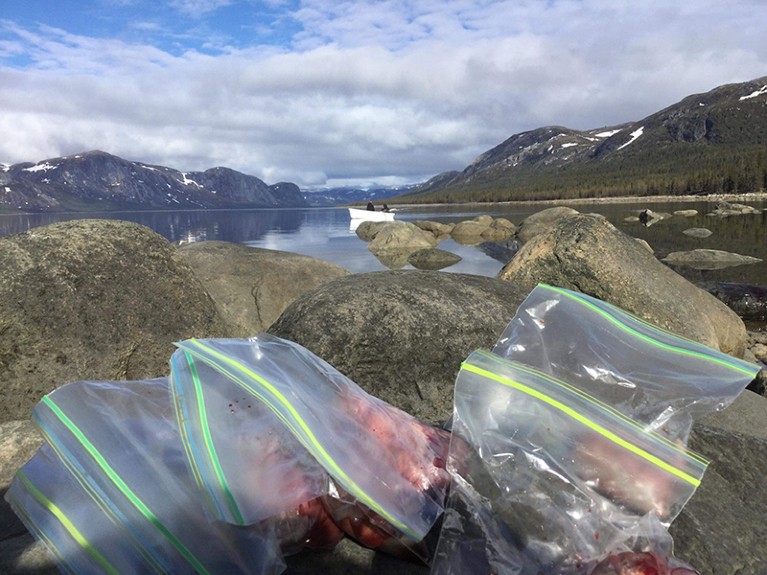
Environmental scientist Max Liboiron runs a feminist, anti-colonial research group.Credit: Alex Stead
Max Liboiron’s academic career criss-crossed science a few times before finding an interdisciplinary home in geography. Growing up in the rural hamlet of Lac la Biche in northeastern Alberta, Canada, where university education wasn’t common, Liboiron dreamt of being a scientist. But in 1998, when they began undergraduate science studies, they became disillusioned with their university’s push towards industrial applications of science and so gravitated towards fine arts instead. After earning a bachelor’s and a master’s degree in visual arts, they returned to science and obtained a PhD in science and technology studies from New York University in 2012.
Liboiron, who is Red River Métis — an Indigenous group of Canada — joined Memorial University of Newfoundland in St John’s, Canada, in 2014 as an environmental scientist and currently heads the Civic Laboratory for Environmental Action Research. With their collaborator Liz Pijogge, northern contaminants researcher for the Nunatsiavut government, a regional Inuit administration, Liboiron runs the most comprehensive plastic-pollution monitoring programme in the Arctic. The lab has also developed a feminist, anti-colonial approach to science, one that has accountability, humility and good land relations at its core. Liboiron tells Nature how this approach shapes the lab’s work and why collective, respectful and thoughtful collaborations are a step towards better science.
What does it mean to run a feminist, anti-colonial science lab?
Everything we do — who we hire, who we collaborate with and how we take out the trash — we do with three values in mind. First, humility, or recognizing that you are part of other relations. Second, accountability, or being beholden to those relationships. And finally, collectivity, the idea that no individual is more important than the collective. Together, these values are skewed towards good land relations: the acknowledgement that we’re always on Indigenous land, and that land exerts its authority and needs, and we must listen to it. Feminism and anti-colonialism are useful labels to make what we do here comprehensible.
You stress ‘anti-colonizing’ science and not ‘decolonizing’. How are the two terms different?
In Canada and the United States, ‘decolonization’ can often mean giving land back to Indigenous peoples and respecting Indigenous sovereignty. But I can’t return land in a lab. In academia, everything and the kitchen sink is counted as decolonization, such as inclusion of under-represented groups, or modifying syllabuses to reflect multiple world views. Decolonization is a very promiscuous term. I’ve stopped using it because it’s been so heavily co-opted and become meaningless.
I’ll instead say anti-colonization, which means, we are not assuming entitlement to Indigenous land and life for resource use or research access. For example, asking permission before working on Indigenous land is minding your manners in a way that doesn’t reproduce colonization. The use of the term anti-colonization is just being more specific about what we’re doing.
Community peer review is an integral part of your research. What does it mean, and how does it influence your science?
It starts with the fact that all our research questions come from the community. There’s no just-for-curiosity’s-sake science here. Because we do a lot of monitoring for contaminants, we get questions about plastic ingestion in eider ducks, Arctic char, salmon and cod — all important food sources for the communities we work with.
I also do participatory statistics: I go to these communities with the findings, and we co-analyse. The communities don’t talk about statistical models, but they’ll give me more variables and categories to work with in my models, on the basis of their traditional knowledge and observations, and it’s my job to interpret that. The community peer review is like a form of validation and they ground-truth my analysis. It takes us longer to do it this way, but our science is way better in terms of choosing species and geographical areas, and seasons in which to work, all of which are important to the community.
Another anti-colonization aspect of your research is the ‘rematriation’ of samples. Why is that important?
Rematriation means returning things that science has taken, whether that’s samples, artefacts, photographs, documents or genetic material. Science has a long history of taking things from the land and people. But those belong to the community.
We work with animal guts in our lab. When you gut an animal in the wild, you always leave the guts behind for other animals to eat, and that way the nutrients circulate. It’s how you’re supposed to deal with the land, either as a scientist invested in nutrient cycles, or as an Indigenous partner or person. Because we study food webs, we return the animal guts and make sure they go back into the original cycles and relationships, instead of labelling them as a ‘biohazard’ and incinerating them, as is usually done in lab work.

Fish-gut samples collected by Max Liboiron’s research group await return to the ocean in the Nunatsiavut region of northeastern Canada.Credit: Liz Pijogge
Are there other ways in which your research is shaped by the lab’s core values?
We recognize Indigenous sovereignty, and we don’t go anywhere we are not invited to collect samples or do our science, even if that science will be amazing and useful. When we’re working with a partner community, we are beholden to their values, protocols, cultural needs and traditional knowledge. We don’t use environmentally hazardous chemicals such as potassium hydroxide in our lab work, because we return samples back to the land.
We hire local people, even if they do not have previous science experience, and train them. Our lab is full of Black, Indigenous and people of colour (BIPOC) researchers, transgender persons, women and local people, all of whom have valuable knowledge that is often pushed out of science. We also practise citational justice, a process that ensures gender parity and increased citations of authors of colour and of non-academics. We find ways to cite oral histories, plus community members and knowledge holders who don’t publish journal articles, by looking for citation formats that allow us to do so.
In our lab, people’s mental health is taken care of, and we talk about feeling a sense of belonging and family. Our number-one rule is: if you’re sick, heartbroken or exhausted, you go home. It’s okay to fail in our lab and make mistakes. People also have permission to leave academia when it’s hurting them.
How should other researchers use the anti-colonizing lens in their science and work with communities?
Our bumper sticker for that would be, ‘Don’t be a jerk!’
The first step is to do your homework: understand the community, what it needs and whether your skills and research would be useful to it. Meet people on their terms. Take them seriously when they have other forms of knowledge. And hire people and pay them what they are worth. Don’t lead with individualism and think you own everything, when the data come from Indigenous land. Have a reputation for giving data back and doing it in a timely manner.
Second, identify where colonialism is absolutely happening in your discipline and then try to address it. It’s really hard to see the ground when you’re already standing on it.
Finally, a lot of people go into science because they care about land or have a love for nature. By working the way our group does, we end up beholden to land relations more than to things such as efficiency. This is a specific framework for doing good in the world. It’s not the only one, but it’s concrete and it’s working.


 Invest the time to build trust among marginalized research participants
Invest the time to build trust among marginalized research participants
 Charting a course to make maths truly universal
Charting a course to make maths truly universal
 How to include Indigenous researchers and their knowledge
How to include Indigenous researchers and their knowledge






